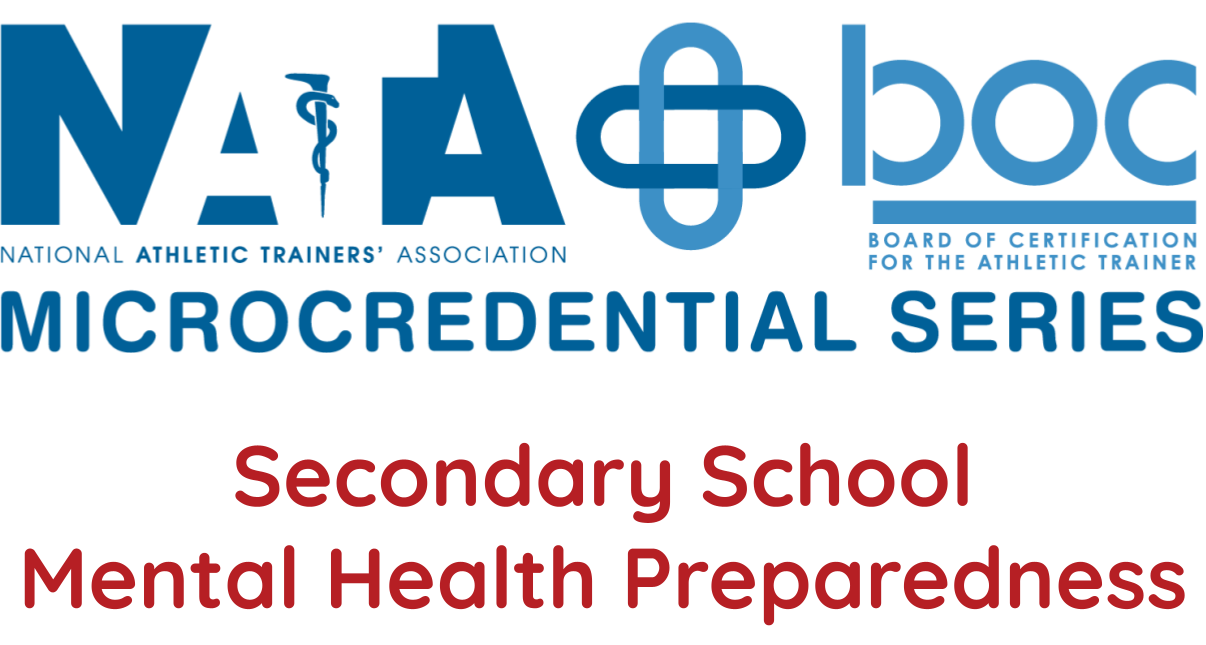
Evolving Concussion Prevention and Care Across the Life Span
-
Register
- Non-member - $50
- Member - Free!
- Student - Free!
- Staff - Free!
- Certified Student - Free!
- Retired - $30
This presentation is a replay from NATA 2019 in Las Vegas, offering a second chance to experience the event's valuable content and insights.
Abstract:
Much of the work to date for concussion has focused on evaluation/assessment in young adults. (McCrory, 2017; King, 2014) However, recently the CDC published a guideline outlining care specifically for children. (Lumba-Brown, 2018) There is little convergence of evidence across age groups to understand how concussion prevention and management evolves over the lifespan. Due to the fast pace of emerging evidence (McCrory, 2017), it is challenging for clinicians to understand how to apply new evidence to age appropriate groups concerning education/information for patients/families, injury mechanism, overall care, and treatment. Thus, the primary practice gap that exists is a gap in knowledge and competency for: 1) understanding of how current evidence supports best practices across the lifespan, and 2) basic competency to apply concussion prevention and care strategies that are age and clinically appropriate with the fast pace of emerging evidence (Schneider, 2017).
Objectives:
- Participants will be able to describe head impact characteristics that are related to symptom presence, clinical and physiologic presentation, and quality of life in youth and high school athletes.,
- Participants will be able to summarize effective educational strategies that may improve concussion disclosure among high school and college athletes.,
- Participants will be able to identify multifaceted & active management strategies that may improve symptom presence and overall quality life that will be useful in clinical practice for athletes ranging from youth to retired.
Level:
Advanced
Domains:
Domain 1: Risk Reduction Wellness and Health Literacy
Domain 2: Assessment Evaluation and Diagnosis
Domain 4: Therapeutic Intervention
CEUs:
2.0 Category A
Keywords: concussion, head injury, impact, care, prevention, symptoms, treatment
On-Demand (Enhanced Access) Course Expiration:
Courses registered for after February 5, 2025, must be completed by December 31, 2025, at 11:59 p.m. CST.
For full details, refer to the expiration policy on our FAQ page.
Joel Stitzel, PhD
I have been at Wake Forest University since 2003 and currently serve as associate head of the Virginia Tech - Wake Forest University School of Biomedical Engineering and Sciences, as well as program leader of the Virginia Tech – Wake Forest University Center for Injury Biomechanics.
My specialty and area of training is biomechanics. My interests include human injury biomechanics, particularly computational modeling of the human body and the relationship between computational model-based metrics and criteria and real-world injury and disease.
I have served as co-PI of a Crash Injury Research and Engineering Network (CIREN) Center at WFU since 2005. I was the founding PI of the Global Human Body Models Consortium (GHBMC) Integration Center at Wake Forest, an organizer in a global endeavor to create an industry-standard virtual human model for injury prediction.
Our research group’s multidisciplinary teams have received support from the NIH NINDS to study concussion and subconcussion. We use instrumentation, neurocognitive testing and medical imaging to better understand the biomechanical basis of and physiologic response to subconcussive head impacts in youth sports. Our group has developed an in-mouth sensor for measurement of head impacts in helmeted and non-helmeted applications.
I work in the areas of automotive, sports, military, aerospace, and medical device applications. Our research teams have received support from industry and government sponsors including the DOT, NASA, NSF, CDC, DOD, and NIH.
Johna Register-Mihalik, PhD, LAT, ATC, FACSM, FNATA
Dr. Johna Register-Mihalik is the Associate Chair for Curricula and Faculty Affairs and an Associate Professor in the Department of Exercise and Sport Science at The University of North Carolina at Chapel Hill. She is also a core faculty member in the Matthew Gfeller Center and serves as the Co-Director of the STAR Heel Performance Laboratory and Traumatic Division Director for the National Center for Catastrophic Sport Injury Research.
Her primary research work is based in her background as an Athletic Trainer and centers on novel behavioral and clinical interventions to improve concussion care across the lifespan. She has been the recipient of several research grants to pursue this line of work including funding from the Department of Defense, the Centers for Disease Control, and several foundations. Dr. Register-Mihalik is also an active member of many professional organizations including the National Athletic Trainers' Association and the American College of Sports Medicine and is a Fellow in both organizations.
Kevin Carneiro, DO
A native of Canada, Dr. Carneiro who received an honors undergraduate degree from the University of Toronto in 1999. In 2005, he received his medical degree from the Philadelphia College of Osteopathic Medicine. Following medical school, he completed residency training in Physical Medicine and Rehabilitation (PM&R) and a fellowship in Sports and Spine Rehabilitation at Northwestern University Medical School / Rehabilitation Institute of Chicago (RIC). He is a board-certified physiatrist in physical medicine and rehabilitation as well as sports medicine.
Prior to coming to UNC, Dr. Carneiro served as a clinical instructor and chief resident at RIC. While there, he received the Meyer S. Gunther Award, which is given to the second-year resident who displays the art of listening, understanding and interacting with patients. Additionally, he won the Walter E. Heller Chief Resident Award and the Dr. Scholl’s Research Award.
He has conducted research and written book chapters and journal articles on musculoskeletal, sports and occupational rehabilitation medicine, most recently on exercise for low back pain. He presents regular lecture modules in musculoskeletal, sports and spine rehabilitation, and has lectured at various meetings on subjects ranging from complementary and alternative approaches to pain management, to return-to-play guidelines for athletes.
Outside of work, Dr. Carneiro enjoys daily exercise, competing in triathlons, meditation, singing, playing the guitar, and spending time with his family and friends.

